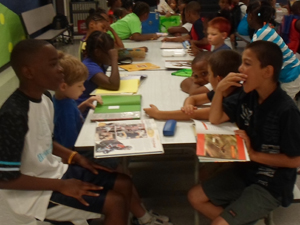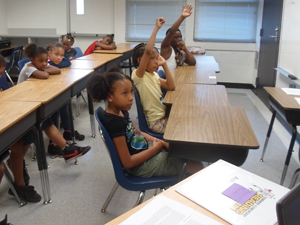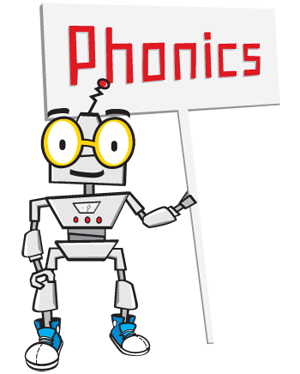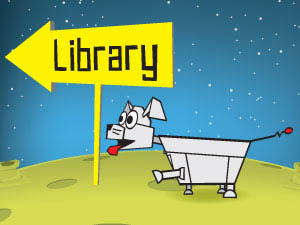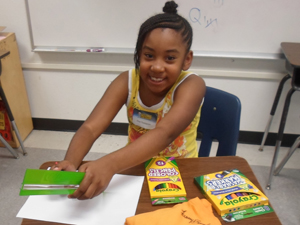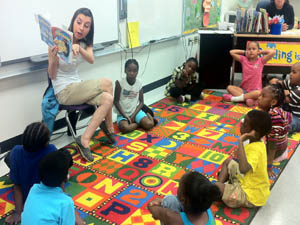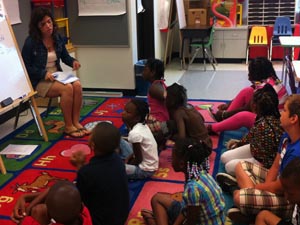Reading Classes
What if a camp focused much of its activities on helping children learn to read? Welcome to Reading Explorers! For morning sessions, Monday through Thursday, participating children are assigned to homeroom classrooms of approximately 15 Explorers. Small class sizes give certified teachers, and their partner Camp Assistants, the opportunity to execute the most focused instruction possible.
The Curriculum
TimeWarp Plus is grounded in a decade of validated research to prevent and reverse summer reading loss. In a national study, students sampled from seven school districts made gains of 5–9 months during the summer program. A similar study of more than 14,000 students across nine districts showed equally dramatic results.
Through implementation of the Voyager TimeWarp summer reading program, each Reading Explorer is launched into a class-wide journey where they are discovering such places as local communities, Egypt and Ancient Rome. A research based reading intervention curriculum for at-risk students, the Voyager TimeWarp summer series aims to prevent summer learning loss, particularly among disadvantaged urban children. These learning tools were designed in conjunction with organizations such as the Smithsonian Institution and the Discovery Channel in developing curricula and in applying the latest instructional technology, such as video and online resources.
The Exploration
Each day is divided into instructional blocks. During the 2.5-hour morning block, teachers focus on reading comprehension skills with engaging text. Through targeted phonics instruction, introduction to key vocabulary terms, and repeated fluency practice, each student is receiving the intervention needed not only to prevent summer learning loss, but prepare the student for the upcoming grade.
Students are exposed to opportunities to engage with lessons through a mix of whole group and small group settings. The two-hour afternoon block allows students to work in a group setting to participate in project-based learning. Students use their new-found knowledge and understanding in small group center station rotations. Students practice independent reading, fun activities such as identifying places on maps, creating mosaics, or writing letters to the community. While the students are taking adventures around the world, teachers work in differentiated small groups where they offer students targeted instruction at their independent levels.
Kindergarten
Given that a great majority of the students at Edwards Elementary School are significantly behind grade level, additional intervention outside of the TimeWarp curriculum has been necessary to get the kindergarten class on level and more prepared to tackle first grade content. This summer’s kindergarten teacher has chosen to use the Open Court model for instructing the kindergarten students. Through an Open Court approach, Mrs. Tea teaches her students alphabetics, phonological awareness, and phonics. Each student practices these skills through reading books that contain a high proportion of phonics elements taught through daily lessons. The big goal for this class is that students will have mastered all of their letter names and sounds by the end of the summer program.
At the beginning of the Reading Explorers summer program, all Explorers were administered the Voyager TimeWarp pre-test. This pretest is aligned to help guide teachers think about where missing gaps were in students phonological and comprehension skills, particularly as they pertained to the summer lessons. Although this assessment was used as a baseline, the results from this summer program will come from two key indicators of progress, both the DIBELS and the Gates McGinitie reading assessment. These nationally referenced reading assessments have provided us with grade level correlations for such categories as auditory listening skills, word decoding, vocabulary, and comprehension. In partnership with Oklahoma City Public Schools, students were administered this assessment last summer and three times throughout the school year. This breadth of data will not only allow us to track progress as it pertains to the summer program, but also track results as students progress throughout the school year. Our goal is to meet or exceed last year’s significant reading results as you can see here.
View Current Photos
View Koobian Olympics Photos
View Videos Of the Camp Experience
View Photos Of the Explorers - 2011
